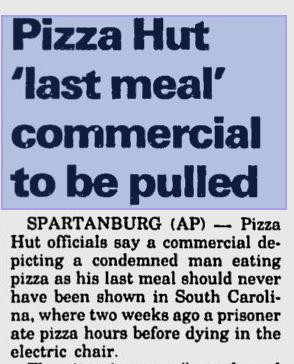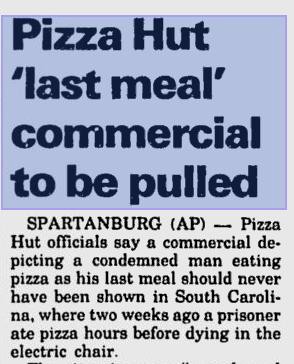A History of the Last Meal, and the “Intimate Relationship Between Food and Death”


Via Longreads, a piece by Brent Cunningham at Lapham’s Quarterly that had me at hello:
In January 1985, Pizza Hut aired a commercial in South Carolina that featured a condemned prisoner ordering delivery for his last meal.
The essay covers many angles of this alternately compassionate, perverse and titillating idea — the paradox of “marking the end of a life with the stuff that sustains it,” the plain fact that “eating and dying are universal and densely symbolic human processes.” There’s of course a lot of great history: in Rome, gladiators were feasted well on the night before the arena, and the Aztecs, as part of a “pre-execution deification ceremony that could last up to a year,” would fatten up their human sacrifices. The recent past appears horribly gripping as well:
Duma Kumalo, who spent three years awaiting death in South Africa, was served a whole deboned chicken and given seven rand — about six dollars — to purchase whatever else he wanted. “What we bought before execution, it was not things that we wanted to eat,” said Kumalo, who was spared for reasons he does not explain, just hours before he was to be killed. “Those were the things which we were going to leave behind with those who would remain. Because people were starving.”
In America, where the death rows — like the prisons generally — are largely filled with men from the lower rungs of the socio-economic ladder, last-meal requests are dominated by the country’s mass-market comfort foods: fries, soda, fried chicken, pie. Sprinkled in this mix is a lot of what social scientists call “status foods” — steak, lobster, shrimp — the kinds of foods that in popular culture conjure up the image of affluence. Every once in a while, though, a request harkens back to what, in the Judeo-Christian West, is the original last meal — the Last Supper, when Jesus Christ, foreseeing his death on the cross, dined one final time with his disciples. Jonathan Wayne Nobles, who was executed in Texas in 1998 for stabbing to death two young women, requested the Eucharist sacrament. Nobles had converted to Catholicism while incarcerated, becoming a lay member of the clergy, and made what was by all accounts a sincere and extended show of remorse while strapped to the gurney. He sang “Silent Night” as the chemicals were released into his veins.
[LQ]